Some basic concepts to know about Search Engine Optimization - SEO (part 2)
QuanTriMang - Search Engine Optimization, or often called search engine optimization, is probably not strange to many of us. But knowing the nature as well as taking advantage of SEO is not everyone knows and performs properly. In part 1, we have provided you with information about SEO and keywords. In Part 2, we will continue to provide the next most basic concepts and elements about SEO.
>>> Google Panda - Algorithm for real rankings?
3. Backlink - An important part of SEO
3.1 What is backlink?
In layman terms, there are two types of links: inbound and outbound . Outbound links are links from your website to other websites, while inbound links (also known as backlinks ) are links from other websites to your website. For example, if cnn.com links to yourdomain.com (your website), the link from cnn.com is a backlink (inbound) for yourdomain.com. However, for cnn.com, this link is outbound link. Backlink is one of the most important parts for a good Search Engine Optimization (SEO) .
3.2 Why Backlink is important
The number of backlinks is a sign of website popularity or importance. Backlink is very important for SEO because some search engines like Google will trust more about high quality backlink websites as well as consider these websites more relevant to their search results than those of others. another page in a search query.
Therefore, when search engines calculate the relevance of a website with a keyword, they not only consider the number of backlinks to this page but also consider their quality. To determine quality, search engines will review the content of the website. When backlinks to your site originate from another site and these pages have relevant content on your site, these backlinks are considered more relevant to your site. If the backlink is found on websites with unrelated content, they are considered less appropriate. The more appropriate Backlink , the higher their quality.
For example, if a webmaster has a website about how to save abandoned dogs and get a backlink from another website about dogs, they are considered to have a higher degree of relevance in the search engine's rating than on the road. link from website about racing. Therefore, the higher the relevance of the website link back to your site, the higher the quality of the backlink .
Search engines want websites to have a level playing field and look for links that are built naturally over time. Although editing websites to make them more SEO friendly is quite easy, the difficulty lies in how to create influence on other websites and make them link back to your website. This is why search engines value the backlink as an extremely important factor. In addition, the search engine's criteria for the quality of received backlinks are even more difficult because untruthful webmasters have tried to take backlink by using fraudulent and sneaky techniques. They can use hidden links, or automatically generated pages for the sole purpose of providing backlinks to websites. These pages are called link farms. They are not only ignored by search engines but also linked to a link farm, which makes your website completely banned.
3.3 Anchor Text - a string of linked characters
When a link is associated with a keyword in a hyperlink, we call it anchor text. Or, the temporary anchor text as ' link character ' is a string of characters hidden that contains a link to a Web page or other resources. The link character of a link can be one of the most powerful sources a webmaster owns. Backlink from multiple websites with 'lost dog' anchor text will help your website rank higher for the keyword 'lost dog'. Using keywords is the leading way to use hyperlink to avoid linking to words like " click here " - words that have nothing to do with your website. The 'Backlink Anchor Text Analysis Tool' tool will help users search for backlinks and characters used to link to their website. If you discover that your website is being linked from other websites, but the anchor text is not used properly, you should ask that website to change the anchor text to a more relevant keyword. This will help increase the ranking of the website.
3.4 How to build Backlink
Even if there are lots of backlinks to your site naturally, having high quality backlinks is something anyone wants to own.
a. Backlink Builder: When you enter a search keyword, the Backlink Builder tool provides users with a list of relevant sites where users can get some backlinks .
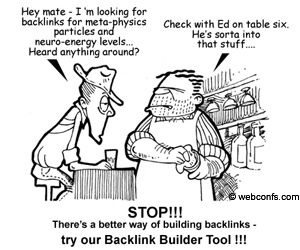
b. Contributed in the address book : If you're wondering about the presence of a website, presenting address books like DMOZ and Yahoo is a must, not only because it's a free way to get quality backlinks. it is also a way for search engines and potential visitors to recognize you. In general, the "presence" in the address book is free, but the downside is that sometimes users will have to wait for several months to be listed in the category you choose.
c. Forum and address book : Typically, search engines index forums. So, posting on forums and blogs is also a way to get quality backlinks with the anchor text you want. If the forum or blog is highly respected, backlink is very valuable. However, in some cases, the forum or admin blog may edit the post of the poster or even delete it if it does not match the forum or blog's terms. Besides, sometimes admin staff does not allow links to posts, unless they are related. In rare cases, forum or blog owners can ban search engines from indexing them. In such a case, no backlink makes any sense.
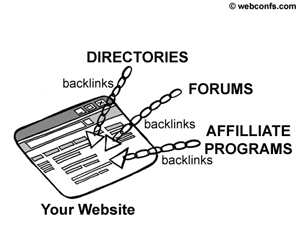
d. RSS Feeds : Users can provide free RSS feeds for their favorite sites, when other sites post your RSS feed, you will get backlinks to your website and a lot of potential visitors. They will visit your site for more details on the headlines and titles they have read on other pages.
e. Affiliate software : Affiliate software is also very good at getting more visitors (and customers) and building backlinks . However, this is quite an expensive way because the affiliate task only succeeds in about 10 to 30%. However, if you have affiliate software, why not try it to get more quality backlinks ?
f. News announcements and press releases : Although this is not a way to build backlinks every day, it is also a method that brings good results if used correctly. There are many sites that publish news and press releases for free or for a small fee. A professional article about some important event can give you a lot of visitors and backlinks from reputable sites - a good way to increase SEO. The difficult part is that you cannot give a press release if there is no event worth bringing up. That's why we say news announcements and press releases are not a convenient way of building backlinks .
3.5 Link usage activities should be avoided
There is a lot to say in recent months about interactive links. In some recent updates from Google, interactive links are one of the goals of search engine filtering. Many webmasters have agreed to exchange interactive links to increase the ranking of the website. In an exchange link, this webmaster places a link on their website pointing to another webmaster's website and vice versa. Many of these links are not relevant at all. So, along with unrelated backlinks that are ignored by search engines, such outbound links are still counted but lower the relevance of the websites. This will make a large website relegated to Google.
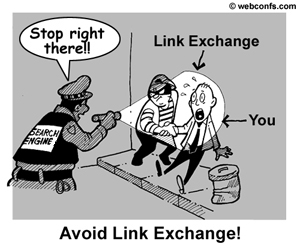
Google's way of working also has a creative point when it not only considers the popularity of the link website, but also the reliability of the site you link from your website. This means you only have problems with the search engine when linking to bad sites.
Many webmasters own many websites. Sometimes, these sites are related, sometimes not. Users should also be careful to connect multiple websites together on the same IP address. If you own 7 websites that are related to each other, then linking to each of those sites on a page can be harmful to you because the search engine may consider you are trying to do something shady. Many webmasters try to create backlinks this way and have too many links to sites that share the same IP address as backlink bombs.
Besides, one thing is certain that the link between multiple websites does not help users change the search engine's stance. The only reason you want to connect sites is to give visitors more information and resources to access. In this case, it is acceptable if you provide visitors with a link to another site, but try to keep at least the affiliate links that share the same IP address. One or two links per page are acceptable.
4. Metatag
4.1 What is Meta tag?
Meta tag - meta tag - is used to summarize information on a page of search engines. This information is not directly visible to visitors to your website. The most popular meta tag is - meta keyword - and description - meta discription .
A few years ago, meta tags are the leading tool for search engine optimization and there is a direct correlation between keywords in meta tags with rankings in search results. However, algorithms have become much better and the importance of metadata is decreasing day by day.
4.2 Meta Description
Meta Description tag is one of the ways you can write a description for your page, from which to let search engines know the topics and topics related to your website. Some search engines (including Google) use these descriptions to simplify the list of search results. So, if the meta description is well written, you can attract more traffic to your website.
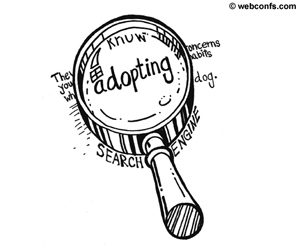
For example, for a dog adoption page, the meta description tag might look like this:
4.3 Meta Keywords
The ability to leverage meta tags is to include a list of keywords that you think are relevant to your page. Popular search engines will not calculate them, but this is still an opportunity for you to focus on the main keyword. Users can add alternative spellings (or even common substitutions of keywords you use) in the keyword meta tag. This may be a minor adjustment to increase search rankings but not so we ignore it.
For example:
4.4 Meta Robot
In this tag, users will have to identify the pages they don't want to index. The truth is that on your site there are content that needs to be kept there but not necessarily indexed for them. Listing these pages in the meta robots tag is a way to remove them from indexing. Another way is to use a robots.txt file and this is a good way to do the job.
For example:
5. Content is top
If you are writing SEO content for both search engines and readers, optimizing them is not difficult at all. Launch some keywords, arrange them by random and see the results received. Sometimes some people copy SEO documents and forget about this. Readers read your text and they expect something to be returned compared to the time and attention they give you. They want to get good content and their desire has shaped how search engines rank your website.

5.1 What is good content?
Good SEO content has 3 main characteristics:
- Provide useful information expressed in a format that attracts readers
- Increase rankings in search engines
- Attract many links from other websites
Notice that the reader is ranked first in the list. Your website needs to provide valuable information to visitors and do this in the most appealing way. Some sites only focus on a limited topic and they have information relevant to themselves. You will have to compete. Make yourself stand out from them with expert interviews, meaningful lists and well-researched sources. Try to write well or ask someone to do this, your investment will be returned with increased traffic.
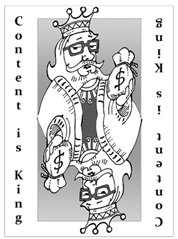
Although search engines are not your main customers, they still affect page rankings. In the early days of SEO , using meta keyword-stuffed has brought a lot of traffic. (Keyword Stuffing is a trick that relates to parts of the web that repeat a certain keyword repeatedly to influence grow up search engine results). People don't want to stop at a page full of promises of discounting airline tickets along with advertising. However, this has no effect on search engines. Every time the search engine's algorithm repeats, it gets better value from clutter, so users should also equip themselves with sharp techniques. Instead of meta tags, they use keywords and spread them through an article.
In April 2011, Google's algorithms changed and made the keyword and spam keyword "devalued" to determine the value of a website to viewers. This update has created a wave on the Internet. From large commercial sites to blog sites, search engines increase the rankings of high-value sites and make cuts to sites that rely heavily on keyword-stuffing. Although the keyword is not worthless, it is no longer the only sign for search engines.
If the SEO keyword has been reduced in value, the link increases in value. If another page links to your site for the purpose of reading, defusing controversies or viewing reliable text, the search engine will look at your site where visitors want to visit. Fill your site with a "bait" link that will help get attention from search engines and those who use them. The best way to create links is to own new, powerful content . Media sites even provide more rumors than big content pages. These links are also counted, so grab them with content pages.
5.2 Write SEO content for search engines and for everyone
SEO now no longer means spreading keywords like we throw away pieces of bread. The latest search engine will scan pages like visitors to your site. Jakob Nielsen, an expert in human-machine interaction research at Technical University of Copenhagen, found that up to 80% of a website's readers surf the page instead of reading one line at a time. They spend a fraction of a second deciding whether it is worth reading. Search engine developers still use this research to adjust and invent more basic and more meaningful algorithms.
What can appeal to readers can also gain attention from search engines. The top left corner of a page is the most valuable place because it is the first spot where readers pay attention. Put important information there so search engines and readers can see them immediately. This is also a great place to put title boxes and news items lists.
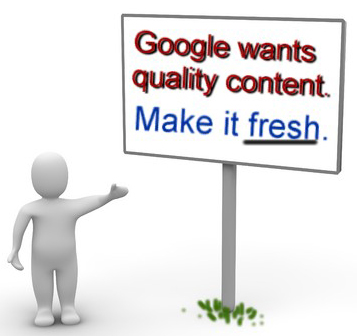
Bold text will help people and tools pay more attention, but remember to use these tags carefully. There are too many bold words that look like ads and make search engines underestimate your page. The bold italic HTML tag should be used for meaningful concepts, not words to emphasize. Bold 'very' or 'more' italics does not make sense to search engines, so apply these tags to important concepts and subheadings.
Search will now target link terms and related phrases, not just keywords. Someone takes the meaning from the context and easily distinguishes the word 'cut' because it applies to hair with the equivalent word applied to storing movies or video games. Let your visitors - both people and machines - know the meaning of what you're talking about. In SEO language, include synonyms and related terms so that search engines can identify the purpose of the website.
Fortunately, there is still a way to work with such content in your content without having to monitor keyword and keyword phrase percentages: just write down what users like to read the most. If you write to readers, the search engine will follow.
5.3 Enemies of SEO - duplicate content, spam and filters
You are looking into what modern SEO content should look like. However, equally important is to understand what should not be. Nielsen's research shows what can keep readers on the page and what makes them leave the page. Search engines will collect such information and lower ratings or remove them completely from ranking.
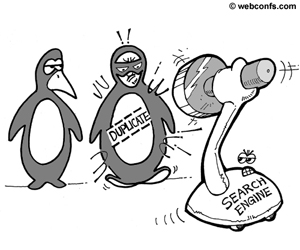
Duplicate content can 'sink' a website. Even if legal content such as full link articles from news sources and using too many quotes will lower the SEO value of the website. Readers do not have any reason to access a website that publishes content of other websites. Page rankings will decrease over time if you do not post original content.
While limiting the number of duplicate content on your page, you also need to pay attention to the time it takes to provide information. Build new content on the basis of other content whenever possible. It will take more work to summarize and assimilate a news or use it as a link to the original article. However, doing so will help your site improve its rankings. If you add the appropriate value and a sharp article and related link, you'll see your rankings improve in search engines.
The old method of keyword formula and meeting the percentage of keywords is not only outdated, but it also lowers your page rankings actively. Downloading multiple keywords is a sign of website advertising and search engines understand this. Using relevant words and appropriate phrases to improve the subject's identity, make your bookmarks more valuable as well as enhance the value of its search engine. Rich text also helps visitors (people) more readable.
Nielsen found that readers often shun sites with many sub-phrases. Obviously, websites with concise content are much more valuable than those with more content. Exaggeration and advertising language - for example, describing a product as 'good unprecedented' or 'perfect solution' - does not contribute to the meaning of the text. Readers will filter out the spreading content and the software will lower the ranking for sites with so much content. Therefore, you should minimize them from your page.
Search engines change their algorithms frequently to provide their users with more relevant search results. Along with that, SEO art also changes. The only object of web text is its readers. The pages that provide novels, compelling content presented in the reader-friendly format will be ranked first.
Try Similar Page Checker to check the similarity between 2 URLs.
Above are some basic points to know about the backlink , meta tag and text content. In the next part of this SEO series, we will provide you with information such as visual extras and SEO ; Static URL versus dynamic URL; promote website to increase traffic.
